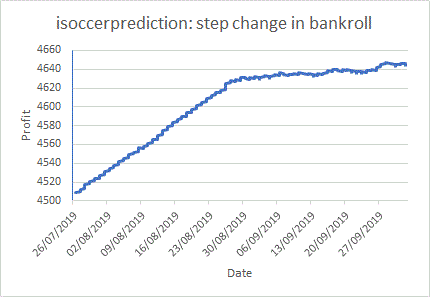Is there any value in tipster verification?
Posted 7th April 2020
Is there any value in tipster verification?
For most punters, the fun of betting lies in the challenge of 'beating the system', winning with wits or skill and proving oneself to be better than the bookmaker, and more importantly better than the market of other bettors whose money makes up that market. If you can make a long-term profit from betting, you have subdued uncertainty, predicted the future, taken control. Wanting control is in our DNA. Tribal shamans have been trying to 'know' the future for tens of thousands of years.
But for others, it's just about the money. And for those who have found it too difficult to find expected value, they must turn to others to help them (as tribal villagers would turn to their shaman to forecast their omens). Enter the tipster. The world of sports tipping, or touting as it's known in America, is a secondary market that feeds off the betting industry. Google it and you will find hundreds, or even thousands, of services offering you picks that claim to be able to make you money.
Of course, if it was that easy, everyone would be making a profit, right? The truth, as I articulated in my second book How to Find a Black Cat in a Coal Cellar: the Truth about Sports Tipsters, is that there are really very few tipsters who are actually worth paying to help you. Certainly, there are many that can be seen, from their results, to be making profits. But almost all of them are lucky, not skilled. I've shown that when you plot a distribution of the performances of a large number of tipsters, it looks almost the same as if they were simply tossing coins.
How can we tell which tipsters are really worth following? Well, in my book I identified a series of points to consider when carrying out due diligence on them. I'm not going to revisit these again here, apart from the most important one: an independently verified betting history.
A tipster shows you a page on their website with their results; how do you know they are true? Without independent verification, this information is useless. We are not talking about customers' testimonials; these are not independent and are frankly equally as useless. (How often do you ever see a bad testimonial?) We are talking about independent proofing. This means the verifier has no financial stake in the tipster's performance, good or bad. They simple report the facts.
For 14 years I ran the independent verification service Sports-Tipsters.co.uk. The lessons learnt from this work led me to write my book. There are now many other independent tipster verification services available online, some of them following on from my example, others less scrupulous and more dishonest. It is important to be able to tell the difference.
Let's deal with the cheats first. In my most recent book Squares & Sharps, Suckers and Sharks: The Science, Psychology and Philosophy of Gambling I told the story of the proofing service VerifiedTipsters.com. For years they presented themselves as the number one online independent tips verification service. Only latterly did it become clear that something wasn't quite right; the aggregated performance of all verified services was simply too good to be true. After a lot of detective work, I uncovered that since the start in 2007 they had been secretly promoting their own services. Thankfully their exposure as a fraud let to their eventual demise and closure.
There are other tipster monitors cheating in a similar way to VerifiedTipsters. Perhaps the most blatant is TipsterConnection. To anyone with even a limited understanding of betting, the results of the monitored services are all impossibly good, with win rates of 80 to 90% where median odds are around 2.00, given the amount of randomness in sports betting. One of their verified services, isoccerprediction, has a yield of 99% from average odds of 2.48 (median 2.00) over almost 5,000 tips. From tip number 4,300 to 4,500 it has a profit growth looking like this.

Why would someone with an ability to print money suddenly change their strategy, dropping their running 100-tip average yield from over 100% down to just 12.5%? Rather odd to say the least. But you don't need to be a mathematician to know this record is manipulated (albeit very badly).
Dig a little further and you can find the services it promotes have domain identities and website architectures similar to or identical to its own. It doesn't take too much effort to uncover the scam. For example, take a look at the websites' css stylesheets and you'll find many identical lines of code for both the verifier and the verified. For other services, although not this one, I have even found the verifier and the verified using the same Google Analytics account. Sadly, however, too many punters looking for a quick profit are blinded by the false promises and fail to perform due diligence.
Fortunately, most monitors are not cheating. Nevertheless, many of them leave themselves open to criticism because of a statistical quirk: survivorship bias. During the Second World War, the mathematician Abraham Wald revealed the problem. US aircraft engineers had assumed that by examining the location of bullet holes of returning aircraft, those areas that showed the highest concentration of bullet holes needed the extra reinforcement. It didn't work. Wald explained that the holes were instead revealing where the planes were strongest, since these were ones returning. No one had given any thought to the planes that were lost. They weren't seen; they hadn't survived. Counter-intuitively, following Wald's advice engineers put extra armour plating where the bullet holes weren't, with immediate results.
Survivorship bias can be particularly apparent with a type of service called a tipster supermarket. These services, Pyckio and Tipstrr being two well-established ones, are not independent monitors in that they earn revenue via the performances of the advertised tipsters. Nevertheless, the supermarket and its tipsters do maintain a degree of separation in as much as the former has no influence on what the latter is advising. Furthermore, given the transparent business model that these services abide by, they can be assumed to be trustworthy.
However, it is frequently the case that such supermarkets remove from view those tipsters who are no longer operating. Ask yourself a question: what is the most likely reason a tipster will stop tipping at a supermarket? Perhaps they want to set up on their own. Or perhaps they just want to stop tipping and concentrate on their own betting. Yes, these will be reasons, but the most common one will be that they have failed, or that the supermarket will consider them to have failed.
If their performances are then removed from view, we are then left with only those tipsters who haven't yet failed. Presumably these surviving tipsters are more likely to be profitable. For most of them they just haven't been around long enough for regression to the mean, or the levelling out of good and bad luck, to get to work on them. Via a little back-of-the-envelope experiment, I was able to show that a population of hundreds of coin-tossing tipsters with no skill at all could collectively be showing a very healthy yield provided the unlucky ones are simply made to disappear.
Traditional independent tipster verification services can be equally guilty of allowing survivorship bias too, if they remove tipsters who are no longer submitting picks to them. All the major services, like Blogabet, Betrush, BetVerified and MyBigPartner do this, even though there is no intention to deceive. It's easy to spot; just look at any tipster league table; if there are far more profitable services than losing ones, you know many of the losing ones have disappeared. Ask the monitor to provide you with all their historical data. If they won't then that's a red flag to suggest they might not as motivated to tell you the truth about tipsters as they could be.
In reality, because so few tipsters genuinely possess betting skill capable of beating the market, this distribution of profitable versus loss-making tipsters should be close to 50-50. That is not to say there are no truly skilled tipsters at all; there are, it's just they are hard to find, with possible only 1 in 100 possessing any genuine profit-making talent at all that is not just relying on short term luck.
Unfortunately, there is another inconvenient truth about most, if not all, independent verification services: they typically report the odds that were advised by the tipster. Any successful tipster, and bettor for that matter, will, with a sufficiently sized volume of money, move a market. That is to say they will shorten the odds. A successful tipster with many customers will likely move a market much more quickly than an unsuccessful one with few customers. Hence, the tipsters who present themselves as the most followable will be the ones least likely to provide you with the profits that are claimed by themselves and published by the independent monitor. If, as a customer, you can never get the advised odds, it may seem a little unfair to report them as genuine. If the tipster is good, you may still be making a profit, but after this odds slippage and your subscription costs, how much profit will you have left over?
Sadly, this is the unintended consequence of tipping success. If you are good, people will find it much harder for your customers to bet the price you advise, or the independent monitor confirms that you advised. Smartbet.io has attempted to solve this problem. Contrary to conventional pick distribution methods like email, website and twitter, picks submitted to smartbet.io are encrypted and automatically distributed to all followers instantly. Since the corresponding bets are also automatically placed instantly, any impact on the market will have been made by legitimate followers themselves. The price the tipster advised and the price that the monitor records is the price that the customers will get.
So should we be paying much attention to tipster proofing services? Independent verification of a tipster's picks is essential to help a potential customer gain trust in that tipster. But equally, anyone thinking of buying tips and using a tipster monitor or tipster supermarket to find tipsters that work for them should be fully aware of all the caveats and pitfalls that come with using them. As for making money from betting, making money via tipsters is not quite the free and easy lunch that many people would have you believe. However, work hard at it and do some proper due diligence in your research, and you might be rewarded at the end.
|






